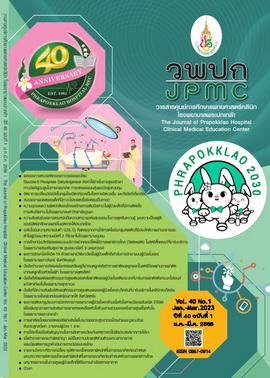The Relationship of Self-Efficacy on Absorptive Capacity and Well-Being in Medical Students in Southern Thailand
Main Article Content
Abstract
BACKGROUND: The Coronavirus disease 2019 (COVID-19) pandemic has resulted in the need to more online medical education. As social interaction becomes limited, medical students probably get emotional exhaustion and burnout. Therefore, they must adapt self-efficacy and absorptive capacity to a new normal that affects their well-being.
OBJECTIVES: The study aims to understand the relationships and influence among self-efficacy, absorptive capacity, and well-being.
METHODS: This study was causal research that collected data in a cross-sectional survey format. The research focused on clinical medical students of universities and Clinical Medical Education Centers in southern Thailand. The stratified sampling framed the selection according to the 4th to 6th-year medical students in equal proportions. The research instrument was a questionnaire administered via e-mail and Google Forms. The researchers obtained 175 respondents surveyed in the last week of September 2022. Partial least squares structural equation modeling (PLS-SEM) was used to assess the structural models and verified the research hypotheses.
RESULTS: Self-efficacy had a significant positive effect on well-being (β=0.43, t=3.26, p<0.01). Self-efficacy had a significant positive effect on absorptive capacity (β=0.74, t=11.08, p<0.001). Absorptive capacity had a significant positive effect on well-being (β=0.48, t=3.84, p<0.001).
CONCLUSIONS: Self-efficacy and absorptive capacity have positively direct influences on well-being. Furthermore, self-efficacy also has a positive indirect influence on well-being through absorptive capacity which is a mediator of the relationship. Therefore, the curriculum policy should promote self-efficacy (especially social self-efficacy) and absorptive capacity (especially acquisition process) to increase the well-being of clinical medical students.
Article Details

This work is licensed under a Creative Commons Attribution-NonCommercial-NoDerivatives 4.0 International License.
References
Alsoufi A, Alsuyihili A, Msherghi A, Elhadi A, Atiyah H, Ashini A, et al. Impact of the COVID-19 pandemic on medical education: medical students' knowledge, attitudes, and practices regarding electronic learning. PLoS One [Internet] 2020 [cited 2022 April 23];15(11):e0242905. Available from: https://doi.org/10.1371/journal.pone.0242905
Mheidly N, Fares MY, Fares J. Coping with stress and burnout associated with telecommunication and online learning. Front Public Health [Internet] 2020 [cited 2022 April 23];8:574969. Available from: https://doi.org/10.1371/journal.pone.0242905
Helou MA, Keiser V, Feldman M, Santen S, Cyrus JW, Ryan MS. Student well-being and the learning environment. Clin Teach 2019;16:362-6.
Kinley K. Towards modelling web search behaviour: integrating users’ cognitive styles. [dissertation]. Brisbane: Queensland University of Technology; 2013.
Hayat AA, Shateri K, Amini M, Shokrpour N. Relationships between academic self-efficacy, learning-related emotions, and metacognitive learning strategies with academic performance in medical students: a structural equation model. BMC Med Educ [Internet] 2020 [cited 2022 April 23];20:76. Available from: https://doi.org/10.1186/s12909-020-01995-9
Sadeghi JK, Struckell E, Ojha D, Nowicki D. Absorptive capacity and disaster immunity: the mediating role of information quality and change management capability. Journal of Knowledge Management 2021;25:714-42.
Kennett G, Hu L, Maritz A, Sun H. Learning huddles: absorptive capacity and sustainable growth of Chinese incubates. Journal of Industry - University Collaboration 2020;2:141-59.
Zappetti D, Avery JD. Medical student well-being: an essential guide. Cham: Springer; 2019.
The New Economics Education. Learning Achievement [Internet] 2012 [cited 2022 April 23]. Available from: https://neweconomicseducation.blogspot.com/2012/02/learning-achievement.html
Milam LA, Cohen GL, Mueller C, Salles A. The relationship between self-efficacy and well-being among surgical residents. J Surg Educ 2019;76:321-8.
Klassen RM, Tze VMC. Teachers’ self-efficacy, personality, and teaching effectiveness: A meta-analysis. Educ Res Rev 2014;12:59-76.
Peng MYP, Wang L, Yue X, Xu Y, Feng Y. A study on the influence of multi-teaching strategy intervention program on college students' absorptive capacity and employability. Front Psychol [Internet] 2021 [cited 2022 April 23];12:631958. Available from: https://doi.org/10.3389/fpsyg.2021.631958
Mestre A, Muster M, El Adib AR, Ösp Egilsdottir H, Byermoen KR, Padilha M, et al. The impact of small-group virtual patient simulator training on perceptions of individual learning process and curricular integration: a multicentre cohort study of nursing and medical students. BMC Med Educ [Internet] 2022 [cited 2022 April 23];22:375. Available from: https://doi.org/10.1186/s12909-022-03426-3
Kock N, Hadaya P. Minimum sample size estimation in PLS-SEM: The inverse square root and gamma-exponential methods. Information Systems Journal 2016;28:227-61.
Gadari S, Farokhzadian J, Shahrbabaki PM. Effectiveness of resilience training on social self-efficacy of the elementary school girls during COVID-19 outbreak. Clin Child Psychol Psychiatry 2022;27:308-19.
Gonzalez RVD, Melo TM. Analyzing dynamic capability in teamwork. Journal of Knowledge Management 2019;23: 1196-217.
Yildiz HE, Murtic A, Zander U, Richtnér A. What fosters individual level absorptive capacity in MNCs? an extended motivation–ability opportunity framework. 2019;59:93-129.

